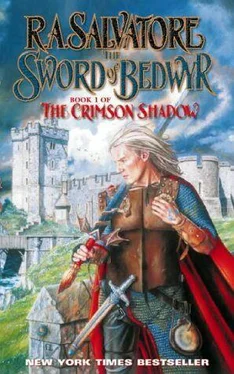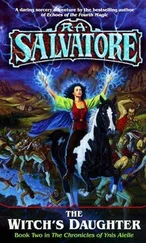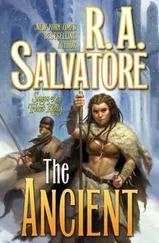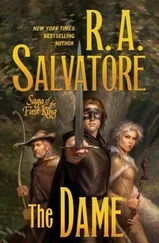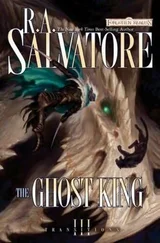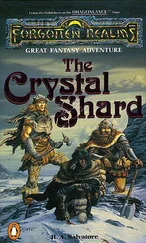And so their morning went: buying, bartering, watching the performers, tossing handfuls of hard candy to the many children running about the crowd. It was truly an unremarkable morning, but one that heightened Luthien’s sagging spirits considerably and made him feel that he was doing a bit of good at least.
By the time they were ready to leave, Luthien carried a tremendous sack over his shoulder. Oliver flanked him defensively as they pushed back through the mob, fearing sharp-knived cutpurses. The halfling was turning his head slowly, regarding one such shady-looking character, when he walked headfirst into Luthien’s sack. Oliver bounced back and shook his head, then stooped to retrieve his fallen hat. The rogue he had been watching openly laughed, and Oliver thought he might have to go over and inscribe his name on the man’s dirty tunic.
“You silly boy,” the embarrassed halfling snarled at Luthien. “You must tell me when you mean to stop!” Oliver batted his hat against his hip and continued his scolding until he finally realized that Luthien wasn’t even listening to him.
The young Bedwyr’s eyes were locked straight ahead in an unblinking stare. Oliver started to ask what he found so enthralling, but following Luthien’s line of vision, it wasn’t really very hard for the halfling to figure it out.
The lithe woman was beautiful—Oliver could see that despite the threadbare and plain clothes she wore. Her head was bowed as she walked, her long and thick wheat-colored hair cascading down her cheeks and shoulders—was that the tip of a pointed ear that Oliver saw peeking from within its lustrous strands? Huge eyes, bright and compelling green, peeked out from under those tresses and showed an inner strength that belied her obviously low station in life. She was at the head of a merchant’s procession, her sharp-featured master a few paces behind her. Oliver thought the man looked remarkably like a buzzard.
Oliver walked up beside his companion and nudged Luthien hard in the side.
Luthien didn’t blink, and Oliver sighed, understanding that his friend was fully stricken.
“She is a slave girl,” Oliver remarked, trying to draw Luthien’s attention. “Probably half-elven. And that merchant-type would not sell her to you for all the gold in Eriador.”
“Slave?” Luthien remarked, turning his confused stare upon Oliver as if the concept was foreign to him.
Oliver nodded. “Forget her now,” the halfling explained.
Luthien looked back to find that the woman and her procession had disappeared from sight into the crowd.
“Forget her,” Oliver said again, but Luthien doubted that to be an option.
The companions went back to their little apartment and dropped off their goods, then, at Oliver’s insistence, went to the Dwelf. Luthien’s thoughts lingered on the woman, and the implications of his strong feelings, as they sat by the bar in the familiar place.
He thought of Katerin, as well, the love of his youth. “Of my youth,” he mumbled under his breath, considering how curious that thought sounded. He had been with Katerin O’Hale just weeks before, but that life, that innocent existence on Bedwydrin, seemed so far removed to him now, seemed another life in another world, a sweet dream lost in the face of harsh reality.
And what of Katerin? he wondered. Surely he had cared for her, perhaps had even loved her. But that love had not fired him, had not set his heart to pounding, as had the mere glimpse of the beautiful slave girl. He couldn’t know, of course, whether that fact should be attributed to honest feelings for the slave, or to the general changes that had occurred in Luthien’s life, or to the simple fact that he was now living on the edge of catastrophe. Had all of his emotions been so amplified? And if Katerin walked into the Dwelf at that moment, how would Luthien have felt?
He did not know and could no longer follow his own reasoning. All that Luthien understood was the lifting of his heart at the sight of the fair slave, and that was all he truly wanted to understand. He focused his thoughts on that look again, on the bright and huge green eyes peeking out at him from under those luxurious wheat-colored tresses.
Gradually the image faded, and Luthien again considered his present surroundings.
“Many of the Fairborn are held as slaves,” Oliver was saying to him. “Especially the half-breeds.”
Luthien turned a fierce look upon the halfling, as though Oliver had just insulted his love.
“Half-breeds,” the halfling said firmly. “Half elf and half human. They are not so rare.”
“And they are held as slaves?” Luthien spat.
Oliver shrugged. “The pure Fairborn do not think highly of them, nor do the humans. But if you wish to cry tears for any race, my naive young friend, then cry for the dwarves. They, not the elves or the half-elves, are the lowest of Avon’s hierarchy.”
“And where do halflings fit in?” Luthien asked, somewhat nastily.
Oliver ran his hands behind his head, through his long and curly brown hair. “Wherever we choose to fit in, of course,” he said, and he snapped his fingers in Luthien’s face, then called for Tasman to refill his empty flagon.
Luthien let the discussion go at that and turned his private thoughts back to the woman and to the issue of slavery in general. There were no slaves on Bedwydrin—at least, none that Luthien knew of. All the races were welcomed there, in peace and fairness, except for the cyclopians. And now, with the edicts coming from Carlisle, even the one-eyes could not be turned away from the island’s borders. Cyclopians on Bedwydrin would not find themselves welcomed at every door—even keepers of public inns had been known to tell them lies about no open rooms.
But slavery? Luthien found the whole issue thoroughly distasteful, and the thought that the woman he had spied, the beautiful and innocent creature who had so stolen his heart with just a glance, was a slave to a merchant filled his throat with a bitterness that no amount of ale could wash down.
Several drinks later, Luthien was still sitting at the bar grumbling openly to himself about injustice and, to Oliver’s disdain, vengeance.
Oliver elbowed Luthien hard, spilling the meager remaining contents of the young man’s flagon down the front of Luthien’s tunic. Fuming, Luthien turned a sharp gaze on his friend, but before he could speak out, Oliver was motioning for him to remain silent, and nodding for him to train his eyes and ears to a discussion going on between two roguish-looking men a few stools down.
“It’s the Crimson Shadow, I tell ye!” one of them proclaimed. “’E’s back, and Duke Morkney and his thievin’ merchants’ll get it good, don’t ye doubt!”
“How can ye make the claim?” the other rogue asked, waving the notion away. “How long do Crimson Shadows live? What say you, Tasman? Me friend ’ere thinks the Crimson Shadow’s come back from the dead to haunt Montfort.”
“They seen the shadows, I tell ye,” the first rogue insisted. “A slave friend telled me so! And no wash’ll take ’em off, and no paint’ll cover ’em!”
“There are whispers,” Tasman interjected, wiping down the bar in front of the two slovenly rogues. “And if they are true,” he asked the first rogue, “would you think it a good thing?”
“A good thing?” the man slurred incredulously. “Why I’d be glad indeed to see those fattened piggy merchants get theirs, I would!”
“But wouldn’t your own take be less if this Crimson Shadow hits hard at the merchants?” Tasman reasoned. “And won’t Duke Morkney place many more guards on the streets of the upper section?”
The rogue sat silent for a moment, considering the implications. “A good thing!” he declared at last. “It’s worth the price, I say, if them fatted swine get what’s coming to them!” He swung about on his stool, nearly tumbling to the floor, and lifted his spilling flagon high in the air. “To the Crimson Shadow!” he called out loudly, and to Luthien’s surprise, at least a dozen flagons came up in the toast.
Читать дальше
